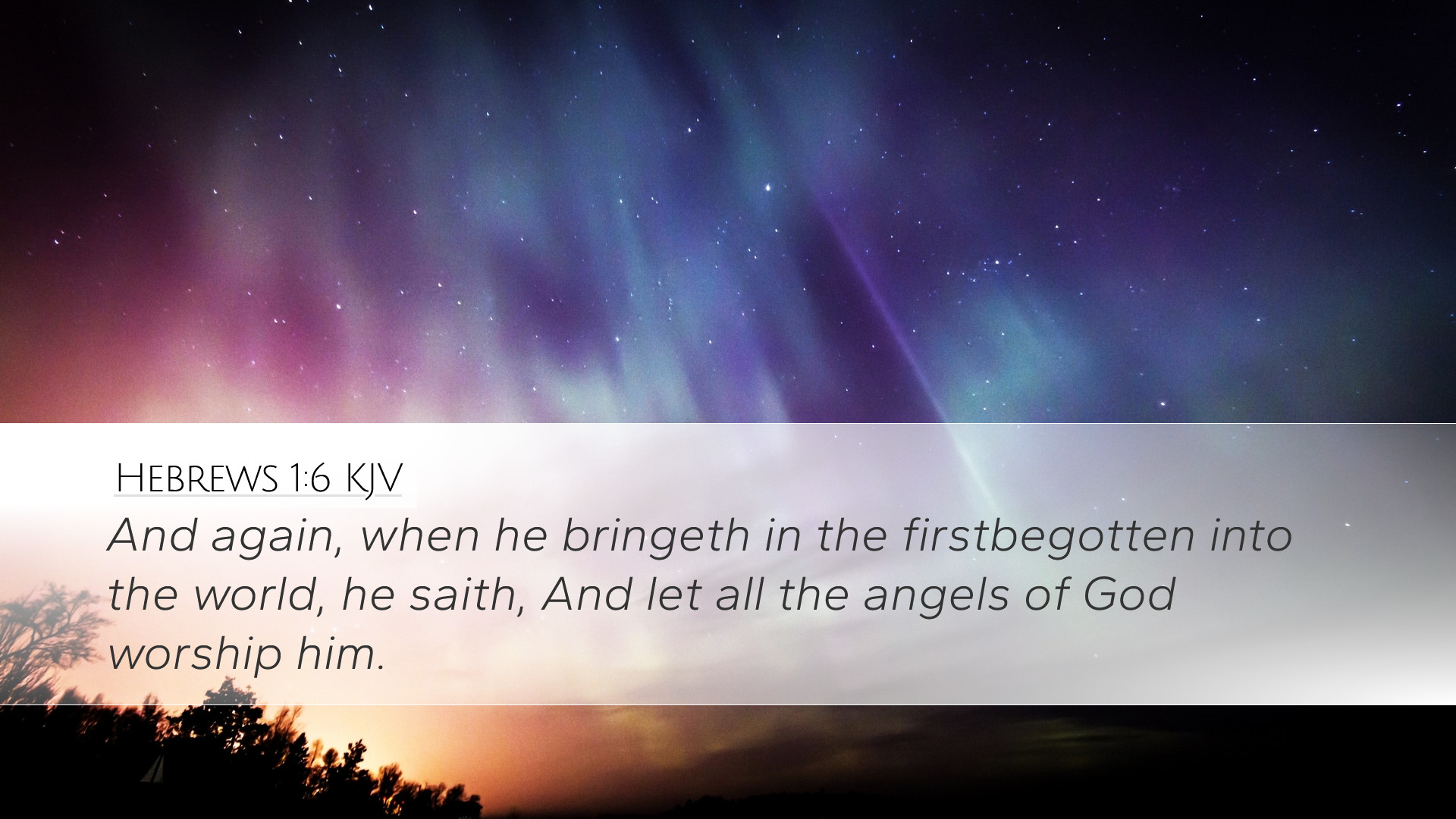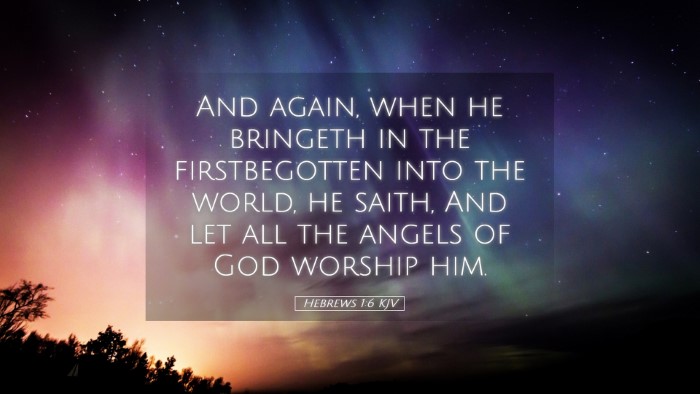Old Testament
Genesis Exodus Leviticus Numbers Deuteronomy Joshua Judges Ruth 1 Samuel 2 Samuel 1 Kings 2 Kings 1 Chronicles 2 Chronicles Ezra Nehemiah Esther Job Psalms Proverbs Ecclesiastes Song of Solomon Isaiah Jeremiah Lamentations Ezekiel Daniel Hosea Joel Amos Obadiah Jonah Micah Nahum Habakkuk Zephaniah Haggai Zechariah MalachiHebrews 1:6
Hebrews 1:6 KJV
And again, when he bringeth in the firstbegotten into the world, he saith, And let all the angels of God worship him.
Hebrews 1:6 Bible Commentary
Commentary on Hebrews 1:6
Verse Reference: Hebrews 1:6 - "And again, when He brings the firstborn into the world, He says, 'Let all the angels of God worship Him.'
Introduction
This verse constitutes a pivotal moment in the epistle to the Hebrews, underscoring the supremacy of Christ and establishing His divine authority. The selected public domain commentaries provide insights into the historical, theological, and practical implications of this proclamation regarding the relationship between the Son and the angels.
Theological Significance
The Supremacy of Christ: The writer of Hebrews systematically contrasts the superiority of Christ over the angels. By referencing Christ as the "firstborn," the text underscores His unique status as both preeminent and eternal. Matthew Henry emphasizes that the term "firstborn" denotes Christ's exaltation and rightful place as heir to all things.
1. The Significance of 'Firstborn'
- Albert Barnes explains that the title "firstborn" indicates the preeminence of Christ in the order of creation. This suggests His priority in existence and importance in the divine schema.
- Adam Clarke asserts that the term 'firstborn' not only refers to Christ’s incarnation but also signifies His position of authority over creation.
2. The Role of Angels
The command for angels to worship Christ further exemplifies His divine authority. The worship of angels indicates a hierarchy in the spiritual realm, where Christ is acknowledged as sovereign.
- Matthew Henry points out that this directive to angels reflects the divine purpose and intent in creation – that all creation recognizes the Lordship of Christ.
- Albert Barnes notes that angels, although powerful and majestic beings, are servants whose primary role is to glorify God and serve His purposes.
Contextual Interpretation
Understanding this verse in its cultural and historical framework is essential. The early Christian community grappled with Jewish traditions and the place of angels within them. The author of Hebrews seeks to reaffirm Christ's exaltation over all intermediaries between God and humanity.
1. Historical Context
- Adam Clarke explains that the statement comes from Deuteronomy 32:43 (in the Septuagint), thus linking Christ's authority to the prophetic traditions of the Hebrew Scriptures.
- This connection served to reassure early Christians that their faith in Christ was rooted deeply in the foundational texts of Judaism.
2. The Early Christian Response
For the early church, affirming the supremacy of Christ was crucial amid challenges from both Judaism and emerging heresies. This verse would have served as a bold declaration countering any notion that angels held equal or surpassing status within God's plan.
Practical Applications
This verse not only serves a doctrinal purpose but also holds implications for Christian living and worship. Recognizing the position of Christ can inform worship practices and theological education.
1. Worship and Reverence
- Understanding that angels worship Christ should invoke a similar response in believers—a deep reverence for His authority and majesty.
- Matthew Henry argues that the act of worship should be centered on Christ, shaping the communal and individual expressions of faith.
2. Christocentric Theology
Theological Enlightenment: Recognizing Christ's sovereignty influences the understanding of salvation. As the firstborn, He is the archetype and the source of new life for all who believe.
- Albert Barnes emphasizes that this understanding should cultivate an appreciation for the grace that comes through Christ alone, distinguishing the Christian faith from other religious systems.
- This understanding also prompts an attitude of humility, recognizing the vastness of God's plan and the grace bestowed upon humanity through Christ.
Conclusion
Hebrews 1:6 stands as a powerful testament to the sovereignty of Christ and His rightful place in the hierarchy of creation. Drawing from the insights of traditional commentaries, the significance of Christ as the firstborn is amplified in its theological, historical, and practical dimensions. Pastors, students, theologians, and scholars should engage with this text to deepen their worship, enhance their understanding of Christ's nature, and strengthen their witness in a world that often seeks to diminish His authority.


